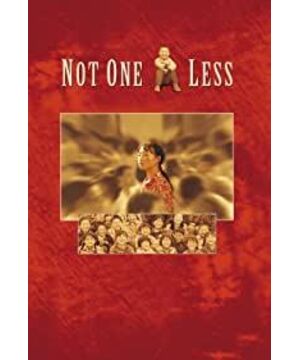film content, screenwriter
The movie "No One Misses" tells the story of Mr. Gao from Shuiquan Primary School who wants to go home to see his seriously ill mother. The village chief finds Wei Minzhi from a neighboring village to give Mr. Gao a month of lessons. Teacher Gao saw that Wei Minzhi was only thirteen or fourteen years old, and he couldn't teach a book, so he didn't want it. The village chief said that it is not easy to find such a person, and she can take care of the baby for you. Let her make do with it for a month and wait for you to come back. There used to be 30 to 40 students in Shuiquan Primary School, and every year there is a loss of students, and now there are only 28 students left. Before leaving, Teacher Gao repeatedly told Wei Minzhi to watch over the students, not one of them. Wei Minzhi let the students copy the texts all day long, and counted the number of people every day. Anyone who wanted to get the students away would be in a hurry, not even listening to the village chief. When the students saw that she was small and could not attend classes, they did not listen to her, and some deliberately made trouble with her, causing chaos in the classroom. She didn't care, she just stood at the door of the classroom and didn't let her go until time was up.
Ten-year-old Zhang Huike had to drop out of school to work in the city because his family was unable to repay his debts. Wei Minzhi remembered Gao Du's advice before leaving, and was determined to find Zhang Huike. She inquired about Zhang Huike's residence in the city. …
Strictly speaking, Wei Minzhi is not a teacher. She is only a teacher from Shuiquan Elementary School who was hired by Teacher Gao to take care of the students on a temporary basis, but she explained to Teacher Gao when she was about to leave - "We must keep the baby under our watch, not one of them is missing", She showed amazing dedication and seriousness. Although she doesn't know how to teach, "responsibility", the most precious spirit of this teacher, is the most simple and perfect embodiment in her. She can go back and forth to find the students, and she can cherish chalk as she cherishes her life. She truly presents all the things we can't imagine before our eyes. Perhaps it is her "one rib" that makes us remember her, and also her simplicity and kindness.
From the perspective of a bystander, the film uses a documentary method to tell the story of an ordinary rural mountainous area. From Wei Minzhi's decision to go to the city to find Zhang Huike, when she was raising the fare to the city, all the children in the class moved together. The bricks also showed the simplicity and unity of the children. In fact, what moved me even more was that after the children moved the bricks, Wei Minzhi bought soda for them to drink with only a little more money. There was an innocent smile on his sweaty face, so clean and pure, one person drank one after another, and the people who watched it were sad.
When Wei Minzhi shouted that he wanted to go to the city to find Zhang Huike, a student, and went to the village chief's house to ask for help, but the village chief put away dishes of big fish and meat and ate the leftovers? He refused Wei Minzhi's request and said he had no money , I can't even help. How angry people are. From the village head's stern attitude towards Wei Minzhi, to bribing Zhang Huike to reveal the hiding place of the students who ran away, and then to the TV station sending Wei Minzhi and Zhang Huike back to Shuiquan Town, the village head was very excited when he saw a truckload of stationery and the students who received the funds. The appearance of the village head shows the mercenary style of the village chief. Isn't this the sadness in the implementation of education work?
When Wei Minzhi was discovered for stealing tickets, she walked a long way by herself, seeing her hard work and perseverance, and waiting outside the TV station for Zhang Huike for a day, and kept asking, "Are you the director? "Her "one tendon" gave me a deep shock.
In the film, the aunt of the TV station who guards the door shuts Wei Minzhi out because she has no documents, and the guard and the aunt of the TV station push each other away. It seems to me that directors set a metaphor through them. They are like an impenetrable wall that separates those who need help from the help they can get, and the way to get help is luck. This also reflects the criticism of the so-called "doing things according to the rules" of the "shirk doctrine" between officials in real life, but it is just an excuse to not want to get into trouble.
Secondly, in the film, when Zhang Huike was found and was interviewed in the car on his way home, he described life in the city like this: "You can get food with your hand." Little Zhang Huike's impression of the city may be good, but we who live in the city can experience a little sadness through the director's lens.
Finally, look at the name of the film, none of them can be missed. The most central sentence in the film, in my opinion, not only students who can’t miss one, but also students who should have their own voice, can have a platform to send it out. People of their own voice, urban and rural, rich and poor.
Comment on the director
Zhang Yimou said: "'No One Can Be Missed' is a film that is plain, traditional, commonplace and even very old-fashioned in content and form, which happens to be one of our goals: to make a real and powerful film in the commonplace. .We filmmakers, under the demands of today's film market, of course, we want to make the films look good. Therefore, our other purpose is: besides being good-looking, the film can tell you what, let you think, and care about. , love what...because I'm a firm believer that the audience's tastes are not as one-sided and superficial as we think."
The documentary style of "No One Can Be Missed" dominates the aesthetics of the entire film, with non-professional actors, documentary shooting techniques, and a poor mountain village primary school, which pursues a sense of authenticity. Regardless of whether this sense of reality is achieved or not, it still infects many people to some extent. At the same time, because the film complies with the policy, the National Copyright Administration issued a copyright protection notice for the film "No One Can Be Missed". This is the first time that my country has implemented such a formal protection for the copyright of a domestic film. However, the encounters of the characters in the film in an unfamiliar environment, the city, became an important reason why the film won the Golden Lion Award in Venice. Of course, because all the difficulties in the film were solved by the mercy of the TV station director, they were criticized by many domestic film critics.
Zhang Yimou is one of the representatives of the fifth generation of directors in China. They are the first filmmakers after the Cultural Revolution. Their films show a strong humanistic spirit, rebelliousness and exploration. For example, in films such as "Qiu Ju's Lawsuit" and "Alive", the style of the film is life-like. Zhang Yimou pays attention to the integration of color and photography skills into the life atmosphere of the film. This kind of film needs to be supplemented and rendered by means of photography, such as shape, color, and light. But there are still many common skills and methods in Zhang's photography. These techniques are not only just right, but more effective. Express the character of the character and the theme of the film. Yimou's photography style is closely related to the themes expressed in his films
These telephoto shots are more innovative and expressive. Zhang Yimou likes to use vision. Each of his films has many long shots. In his earlier films, "Yellow Earth" released a huge appeal because of the decisive use of long-range shooting. In this film, he fully mobilized the means of photography to express the simple, majestic and unique beauty of the Loess Plateau with unique modeling. This also relies on the large-scale use of long-term perspectives to shoot the whole picture of the Loess Plateau.
Of course, the movie "No One Can Be Missed" is no exception. With the repeated application of long shots, the director always describes the whole thing from the perspective of a bystander, presenting the things in a novel in a very real way. in front of the audience.
When it comes to Zhang Yimou's films, we have to talk about his color handling, especially his red elements. "Red Sorghum", "High Red Lanterns" and "Heroes" are indispensable elements in traditional culture. In the film, it not only highlights Chinese culture, but also expresses different meanings.
Zhang Yimou's films use rural themes with strong images of Chinese customs, urban themes focus on people's life in a documentary approach, and martial arts themes use romanticism to write about the grievances and grievances of Zhang Yimou's film scripts. Laying out Zhang Yimou's film style is wild and beautiful.
shooting skills
Shots and color tones, the film's photography contributed to the creation of the film's realism. Hand-held photography is used for most of the scenes in the film, and the strong sense of documentary brought about by the slightly shaky images makes the whole film appear believable. The film also uses long shots, which visually gives the impression that it is an objective presentation of the event. The director observes quietly as a bystander without interrupting it with editing. Although this technique slows down the overall rhythm of the film, it is of great benefit to the enhancement of realism. For example, there is a scene at the beginning of the film where Mr. Gao explained to the substitute teacher Wei Minzhi about the use of chalk. The director used a long shot to express it, making the whole scene smooth and natural, authentic and credible, placing the audience at the scene where the story took place. In terms of lighting, all natural light sources are used throughout the film. Even in the night scene of the school dormitory, the director did not use artificial light sources because the brightness was too low to make the characters unrecognizable.
The sound, the sound of the film is also very good. The whole film uses the same sound to set off the reality of the scene. It is especially obvious that the scene in the countryside is filled with the sounds of all kinds of chickens and dogs barking almost all the time. The director did not eliminate these noisy ambient sounds to highlight the character dialogue, so that each scene of the film is full of life, lifelike, and makes the audience feel immersed in the scene.
Performance, the most important link in the creation of an actor's performance realism style. All the roles in the film are played by non-professional actors with their real names, which greatly improves the authenticity of the film. The protagonist Wei Minzhi's performance is so credible that even his gestures make the audience mistakenly believe that this is a true story - in fact, the film is adapted from Shi Xiangsheng's original novel. In a scene on TV, Wei Minzhi interprets the characters very vividly. From the initial shyness to the final emotional outburst, the whole process is watertight, rich in layers and full of tension. This is not easy even for those movie stars and actresses. The whole film has a temperament that has been washed away, and it can be said that half of it is given by the performance of this group of non-professional actors.
Montage and soundtrack, in this film, the technique of narrative montage is used to enhance the fluency of the story, so that the director's meaning and narrative are well reflected. At the beginning of the film, the rural ridges, barren land, and ancient soil embryo houses are presented in a long-term perspective, rendering the poor face of Shuiquan Town and the rudimentary local conditions and facilities, highlighting the harsh conditions there. In addition, when Wei Minzhi found out that Zhang Huike could be found by means of a tracing notice, she immediately bought paper and pen and wrote it on the stool in the station hall. The old lady has processed the superimposition. The director uses this technique to transition the scene, and the picture is processed very softly, which can also show that the old lady is sleeping very deeply. Film is an art of time and space. In this way, the director compresses the time of a night into a few tens of seconds, which reflects a kind of time and space compressibility and also reflects Wei's persistence from the side. In the second half of the film, Wei Minzhi appeared as a guest on a TV program in the city. She sat in the studio, dazed, but when the host asked her to say a few words to the camera, the camera featured her On her face, she burst into tears, and her eyes were full of thoughts of Zhang Huike and the catharsis of the pressure of teachers' life these days. In doing so, the director enhances the emotional expression of the characters and allows the audience to resonate.
In the soundtrack, Zhang Yimou made some mistakes. In fact, it can be seen that in order to match the overall tone of realism, director Zhang Yimou is relatively restrained in the use of the soundtrack. Nine times, and defeat is defeat, it seems to be a little too hard every time I use it. It is also a scene of Wei Minzhi on TV, where the soundtrack brings the film to an emotional climax. Before this, this sad and gloomy erhu melody has appeared many times, and the emotions have been brewing for a long time. This time, with the camera's long-term stare at Wei Minzhi's crying face and touching lines, many audiences are emotionally embarrassed. Instant collapse, tears like rain. This use of repetitive montage in a stylized film might be the highlight of the film, but it turns out to be a failure in this realistic film. First of all, this technique is very abrupt in terms of style and overall tone, forming a kind of separation from the whole, and it is easy to make the audience play. In this way, director Zhang Yimou destroyed the serious atmosphere that he had worked so hard to manage, and turned it into sensationalism, which directly lowered the film by one notch. You know, tears are too cheap for deep thinking.
However, in general, the flaws do not hide the flaws. The film won the Golden Lion Award at the Venice Film Festival that year, which may be regarded as the best affirmation of this realistic attempt by the freehand master in the hometown of the Neorealism movement.
View more about Not One Less reviews








